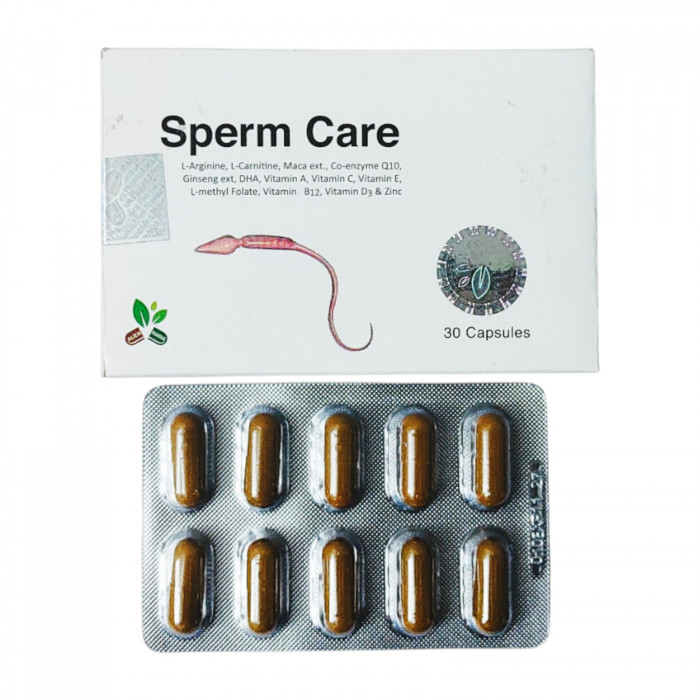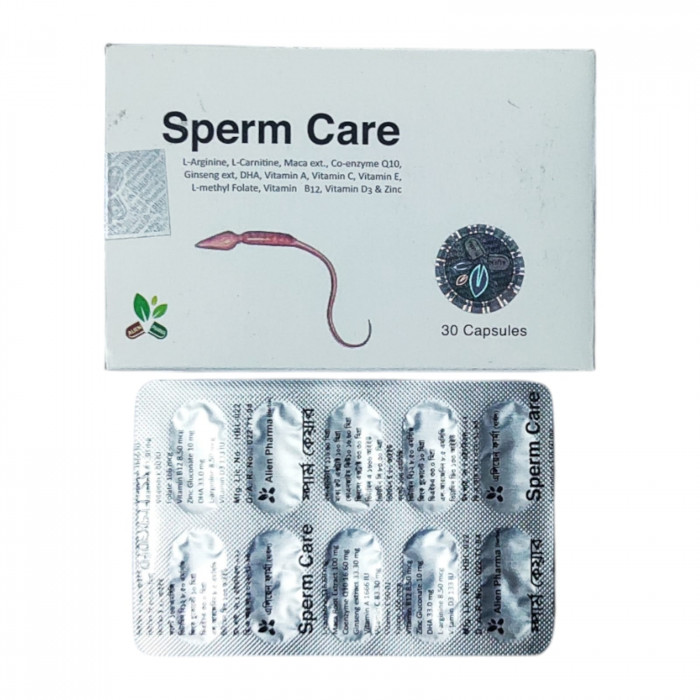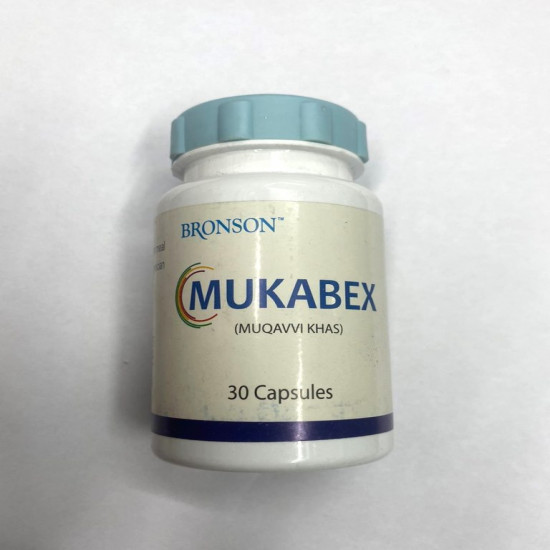

✔ 100% Authentic Product
👁️ Currently Viewing 35058
Sperm Care serves as a precursor for spermin, aiding in sperm production, supporting new cell formation, and promoting sperm development. Additionally, it improves sperm quality, acts as an antioxidant, and enhances sperm motility.
Discount
Price: ৳ 493
MRP:
৳
513.33
4%
Off

100% Genuine Products, Guaranteed

Safe & Secure Payments, Always

Fast, Secure & Efficient Delivery

Proper Packaging
 Cash on Delivery - All over Bangladesh
Cash on Delivery - All over Bangladesh Regular Delivery - 12-24 Hours, Dhaka City* Charge Tk.39-59
Regular Delivery - 12-24 Hours, Dhaka City* Charge Tk.39-59 Regular Delivery - 24-48 Hours, Other Cities* Charge Tk.99-110
Regular Delivery - 24-48 Hours, Other Cities* Charge Tk.99-110
 ফ্রি ডেলিভারিঃ - ৯৯৯ টাকা+ অর্ডারে, ঢাকা
শহরে
ফ্রি ডেলিভারিঃ - ৯৯৯ টাকা+ অর্ডারে, ঢাকা
শহরে ফ্রি ডেলিভারিঃ - ২৯৯৯ টাকা+ অর্ডারে, ঢাকার
বাহিরে
ফ্রি ডেলিভারিঃ - ২৯৯৯ টাকা+ অর্ডারে, ঢাকার
বাহিরে
100% Genuine Products, Guaranteed
Safe & Secure Payments, Always
Fast, Secure & Efficient Delivery
Proper Packaging
 Cash on Delivery - All over Bangladesh
Cash on Delivery - All over Bangladesh Regular Delivery - 12-24 Hours, Dhaka City* Charge Tk.39-59
Regular Delivery - 12-24 Hours, Dhaka City* Charge Tk.39-59 Regular Delivery - 24-48 Hours, Other Cities* Charge Tk.99-110
Regular Delivery - 24-48 Hours, Other Cities* Charge Tk.99-110 ফ্রি ডেলিভারিঃ - ৯৯৯ টাকা+ অর্ডারে, ঢাকা
শহরে
ফ্রি ডেলিভারিঃ - ৯৯৯ টাকা+ অর্ডারে, ঢাকা
শহরে ফ্রি ডেলিভারিঃ - ২৯৯৯ টাকা+ অর্ডারে, ঢাকার
বাহিরে
ফ্রি ডেলিভারিঃ - ২৯৯৯ টাকা+ অর্ডারে, ঢাকার
বাহিরে
✅ Description:
- Spermatogenesis, the intricate process of sperm production, requires specialized support to ensure healthy development.
- A man produces millions of sperm daily, with each sperm taking about 9 to 10 weeks to form.
- Sperm Care combines male herbs, amino acids, vitamins, and minerals to provide the ideal conditions for normal spermatogenesis.
- It nurtures reproductive wellness and supports fertility as part of a holistic health and dietary regimen.
- This product is not intended to diagnose, treat, or cure any disease.
✔️ Usage:
Take 1 capsule twice daily after meals for 4-6 months.
✔️ Male Infertility:
Male infertility refers to any condition in a man that reduces the likelihood of his female partner becoming pregnant. Approximately 13 out of 100 couples face challenges in achieving pregnancy through unprotected intercourse. There can be various causes of infertility in both men and women and surprisingly, in over a third of cases, the issue lies with the male partner. This is typically attributed to problems related to sperm production or the delivery of sperm.
Under normal circumstances, the male body produces tiny cells called sperm, which are delivered into the woman's body during ejaculation. The male reproductive system plays a crucial role in the production, storage, and transport of sperm, all of which are regulated by hormones. These hormones influence the creation of sperm and the production of male sex hormones like testosterone, both of which occur in the testicles. The testicles are situated in the scrotum, a pouch of skin below the penis.
Sperm, once formed, moves into a tube behind each testicle called the epididymis. Just before ejaculation, sperm travels from the epididymis into another set of tubes called the vas deferens. These tubes lead from the epididymis to behind the bladder in the pelvis, where they join the ejaculatory duct from the seminal vesicle. During ejaculation, sperm mixes with fluids from the prostate and seminal vesicles to form semen. This semen then passes through the urethra and exits the penis.
The male's fertility relies on the production of healthy sperm and their successful delivery. Sperm must enter the female partner's vagina, pass through her cervix into her uterus, and reach her fallopian tubes, where fertilization can occur. The entire system operates effectively when genes, hormone levels, and environmental conditions are in balance.
Several factors can disrupt this intricate process, leading to male infertility. These include issues related to sperm quality and quantity, the presence of varicoceles (swollen veins in the scrotum), retrograde ejaculation (semen flowing backward into the body), immunological factors, obstructions in the reproductive tract, hormonal imbalances, and medication use.
Diagnosing the specific cause of male infertility can be challenging and typically requires a thorough examination, including medical history, physical examination, blood tests, and semen analysis. The semen analysis provides critical information about sperm volume, count, concentration, motility (movement), and structure, all of which impact a man's ability to father a child.
In cases where infertility is due to unknown causes or is challenging to treat directly, various assisted reproductive techniques (ARTs) can assist couples in achieving pregnancy without traditional sexual intercourse. These ARTs include intrauterine insemination (IUI), in vitro fertilization (IVF), intracytoplasmic sperm injection (ICSI), and sperm retrieval procedures.
Treatment for male infertility largely depends on the underlying cause, and many issues can be resolved with medication or surgery. By addressing these issues, many couples can realize their dream of starting a family.
✔️ Health Benefits:
- Helps to increase sperm motility.
- Helps in healthy and strong sperm.
- Helps to increase semen volume and increase sperm count.
- Increases sperm fertility.
- Improves sperm quality.
✔️ Quick Suggestions:
Taking the special diet prescribed by our doctor and following the rules will give effective results very quickly.
✔️ Safety Information:
- Read the label carefully before use
- Keep out of reach of the children
✔️ Storage Conditions
Store in a cool dry place
⚠️Disclaimer:
At ePharma, we’re committed to providing accurate and accessible health information. However, all content is intended for informational purposes only and should not replace medical advice from a qualified physician. Please consult your healthcare provider for personalized guidance. We aim to support, not substitute, the doctor-patient relationship.


























